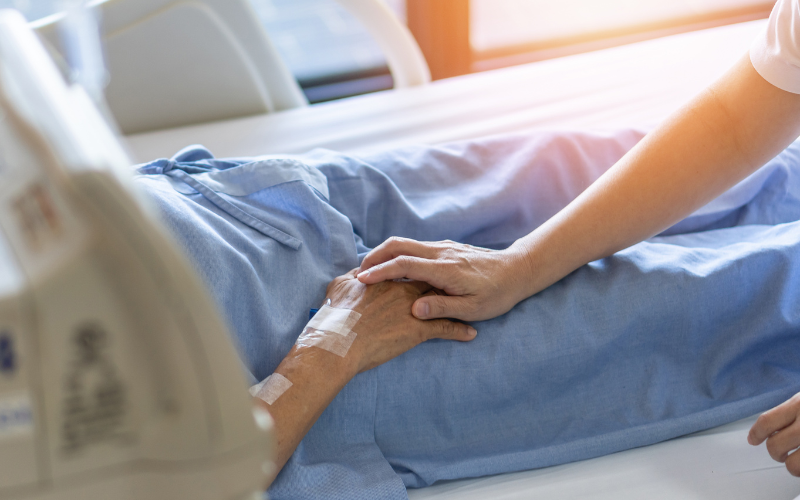
Hospice care is designed to provide maximum comfort at the end of life. Aging family members who are admitted to hospice require ample support with daily tasks as well as emotional distress. Providing end-of-life care for an aging loved one in hospice can lead to greater comfort for everyone.
The dying process is different for every senior. Some older adults remain cognitively alert while their aging bodies severely weaken. Conversely, seniors may experience cognitive decline, although their bodies remain strong. Death can be sudden, or individuals may be in a near-death state for days.
As a senior nears the end of life, hospice care is welcome. An aging person may enter a hospice care facility or receive hospice care at home. When the senior opts for the latter, family members can provide a significant level of care to bring comfort to their final days.
Accepting hospice care at home allows the senior to be surrounded by family and friends. These important individuals ensure that the elderly loved one’s end-of-life wishes are honored and that their dying process is treated with utmost respect. A peaceful death is beneficial for the loved one.
In order to provide continual comfort, family caregivers caring for an elderly loved one in hospice should aim to fulfill care in four key areas: physical comfort, mental and emotional support, spiritual solace, and everyday practical tasks that help the older adult function.
1. Increase Physical Comfort
Discomfort can arise during the dying process from any of numerous reasons, from breathing problems to pain and skin irritations. Seniors in hospice can feel fatigue or experience digestive problems. Caregivers should watch for signs of pain, such as crying and increased agitation.
Pain relief is a priority, and caregivers are advised to provide as much pain medicine as the doctor prescribes. If breathing problems persist, try elevating the head of the bed. Keep the senior’s skin clean and moisturized to prevent skin irritations. Pain prevention is easier than administering pain relief.
The feet and hands of a senior who is close to death may turn bluish or feel cool. Respond to clues about temperature and offer or remove a blanket. When the individual is too fatigued to walk, use a commode for toileting and a bench in the shower.
2. Offer Emotional Support
Fear and anxiety are not uncommon emotions for older adults to feel as they approach the end of life. Caregivers must address their suffering, perhaps by contacting a counselor who is experienced in end-of-life issues. If depression is severe, medications might help.
Caregivers can manage their loved one’s emotional needs with physical touch. Holding the senior’s hand or giving a gentle massage can be assuring. Talk to the elderly person, even if he is unable to respond. By simply being present, caregivers provide the most valuable gift to the dying individual.
3. Provide Spiritual Healing
Finding peace near the end of death is important to seniors in hospice. Caregivers are encouraged to share meaningful memories of happy times with the older adult, which is comforting for everyone. Even if the senior is unconscious, he may be able to hear; speak to him not about him.
Adult children can let the dying person know how his involvement positively influenced their lives. Grandchildren can talk about how much they value their grandparent. Friends, too, should communicate the significance of the senior’s companionship and support over the years.
Especially when seniors find solace in their faith, read from religious texts, or play religious music. Invite someone from the religious community, such as a priest, minister, or rabbi, to hold a conversation with the dying individual. Be respectful of the fact that some older adults struggle with their faith.
4. Help with Practical Tasks
A dying individual will want to be reminded that his personal affairs will remain in order once he has passed. Friends can let him know that a favorite plant will be watered or that a beloved pet will be taken care of. Assurances give the senior a measure of peace.
Handle daily household tasks, too. Pick up the mail, do laundry, and perform household chores to maintain the home while the senior receives hospice care. Keep family members informed about the senior’s condition with a blog, a phone tree, an email list, or a private Facebook page.
Providing the abovementioned forms of care to a dying individual can feel overwhelming and exhausting. Staying physically close to the senior, known as keeping a vigil, can also be stressful and tiring. It’s important to accept the help of family and friends when caring for a loved one in hospice.

Family caregivers are also encouraged to utilize the senior care services from Assisting Hands Home Care to alleviate a portion of the burden of continual supervision. Our wide-ranging home care services are designed to promote the physical, emotional, and social health of seniors in the comfort of home.
We offer quality care services, such as 24-hour care, live-in care, companion care, and after surgery home care. Families who look after the needs of an aging loved one find relief from our respite care. Professional caregivers are available for companion care and overnight care. Seniors benefit from customizable care options.
Our caregivers also provide non-medical hospice home care in Medinah, IL | Glendale Heights, IL | Itasca, IL | Bensenville, IL | Elmhurst, IL | Villa Park, IL | Addison, IL | Lombard, IL, helping to keep seniors as comfortable and pain-free as possible during their final days of life. Skilled memory caregivers are available to deliver specialized services, such as compassionate Alzheimer’s and dementia care.
The nonmedical care services from Assisting Hands Home Care are comprehensive. Professional caregivers support aging care recipients with daily personal hygiene tasks, grocery shopping, meal preparation, transportation, and light housekeeping. We also give timely medication reminders and perform fall-risk assessments.
Families choose Assisting Hands Home Care for the most reliable home care in the Elmhurst, IL area. Schedule a complimentary in-home consultation so that we can determine care needs and establish a flexible, tailored care plan. Call us today at (630) 526-6522 to begin dependable senior care.














